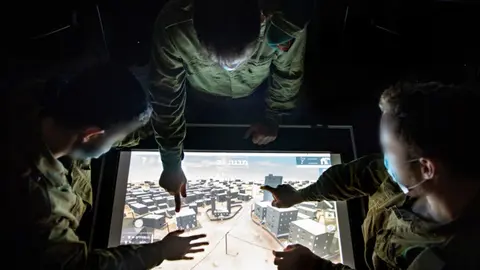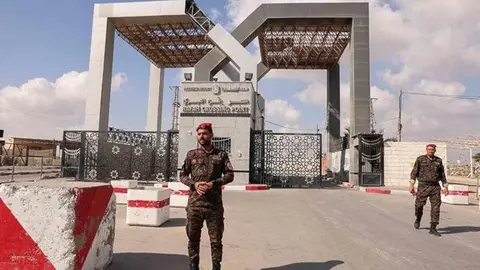"Israel's goal is to destroy Hamas as an organisation"

The brutal Hamas attack on Israel on 7 October marked a turning point in Israeli politics and society. What is already considered the worst massacre against Jews since the Holocaust has provoked a firm response from Jerusalem.
"Our goal is that Hamas does not exist as an organisation, that they do not have the capacity to attack Israel with missiles," says Major General Yaakov Amidror, a former national security advisor, during a briefing on the war organised by the European Jewish Association (EJA).
This aim has been repeatedly stressed by senior Israeli officials as they continue to eliminate the terrorist group's leaders in the Gaza Strip. For its part, Hamas responds to these attacks by launching indiscriminate rocket attacks on Israeli territory, especially in the south and centre.
For this reason, Israel is now preparing for an "imminent" ground operation. "The invasion will only be the beginning, the war will be long," warns Major General Amidror, who indicates that inside Gaza the objectives are: to eliminate all Hamas infrastructure, its offices and the network of underground tunnels. "Cleanse Gaza of Hamas elements," he reaffirms.
Hamas publishes documentation of a drone retrofitted with an explosive. There is a possibility these drones may have been recovered by Hamas at the Gaza border in recent years and and are originally owned the Israeli military. Since 2018, a few of these drone have fallen in Gaza. pic.twitter.com/VflBo6J2WV
— Joe Truzman (@JoeTruzman) October 20, 2023
Recently, Israeli Defence Minister Yoav Gallant also described Israel's military objectives with regard to Gaza and its war with Hamas. During a meeting in Tel Aviv with members of the Foreign Affairs and Defence Committee, Gallant again emphasised the need to eliminate Hamas and the destruction of its military and governmental capabilities, reports i24 News.
The Defence Minister also referred to the creation of "a new security regime in the Gaza Strip", which means a "new security reality for the citizens of Israel and the residents of the surrounding area".
Israeli Defense Minister Yoav Gallant during a visit to the Nevatim airforce base: Hamas members have two options: die in their posts or surrender. There is no 3rd option. We will wipe out Hamas and remove its capabilities." pic.twitter.com/CF18MGOqHk
— Moshe Schwartz (@YWNReporter) October 17, 2023
"War in the south and north is difficult but possible"
In addition to the war with Hamas in Gaza, the Lebanese Shia group Hezbollah - also backed by Iran - has opened a new front for Israel in the north of the country. Since the conflict began, the Lebanese organisation has launched numerous attacks against Israel, leading to the evacuation of thousands of Israelis from the area.
As Major General Amidror states, the situation in the north is "delicate". Hezbollah, pushed to war by Iran, is pushing for Israel to have two open fronts. However, according to the major general, "Israel can deal with Hamas and Hezbollah despite the challenges and difficulties".
Claude Moniquet, founder and president of the European Strategic Intelligence and Security Centre (ESISC), agrees, saying that war in the south and north "is difficult but possible".
The Israeli military says it struck Hezbollah targets Lebanese territory overnight. pic.twitter.com/xqbMMcR6ta
— Hamdah Salhut (@hamdahsalhut) October 20, 2023
Iran's entry into the war "would be the end of the ayatollahs' regime"
On the other hand, the Islamic Republic of Iran is beginning to move its pawns on the Middle East chessboard. Tehran is the main economic and military backer of Hamas and Hezbollah, as well as other armed groups in the region, such as the pro-Iranian militias in Iraq and Syria or the Houthis in Yemen. The Iranian regime's multiple tentacles have a single goal: to fight Israel and the United States, Tehran's two bitter enemies.
In the last few hours, attacks against US troops in Iraq and Syria have been reported. The Ain al-Asad air base, which hosts US forces in western Iraq, came under drone and missile attack on Thursday night, security sources told Reuters. Multiple explosions were reportedly heard inside the base. Separately, a day earlier, a drone attacked US forces in Syria, causing minor injuries.

These two attacks came shortly before a US warship in the Red Sea intercepted up to three missiles launched from Yemen that were likely destined for Israel. According to General Pat Ryder, Pentagon press secretary, these missiles - which "posed a potential threat" - were destroyed in order to "protect" Washington's partners and interests in "this important region".
Since the beginning of the conflict between Israel and Hamas, Iran has threatened to intervene directly in the war if Israeli air strikes on the Gaza Strip do not stop. After the Gaza hospital incident, which was caused by a failed Palestinian Islamic Jihad missile according to several analysts, Tehran has hardened its tone against Jerusalem. Supreme Leader Ayatollah Ali Khamenei said that if the war continues, "no one will stop the resistance forces".
May have been aimed to be something like this. The Iranian-backed Houthis in Yemen have a number of of land-attack cruise missiles (the Iranian 2000km+ range Soumar if given to the Houthis) and drones (including 2000km+ range Shahed-136) which do have the range https://t.co/gPswseAXIy pic.twitter.com/xikViXZZ0W
— ELINT News (@ELINTNews) October 19, 2023
"If the Iranians get involved, the Americans will be more active," stresses Major General Yaakov Amidror. "If Iran intervenes it will be a different war. We know how to reach Iran, we can do it and we will do it if necessary," he adds.
Regarding Iran's possible role, Claude Moniquet believes that no Western country, especially the United States and the United Kingdom, would allow Iran's direct involvement. "It would be the end of the Ayatollahs' regime", he stresses. On the other hand, according to Moniquet, "Israel's security and existence is not at risk".
In this sense, Moniquet also wanted to highlight the importance of the Abraham Accords, as they constitute a "political bloc against Iran". Several Arab countries such as Morocco, the United Arab Emirates and Bahrain have normalised their relations with Israel in recent years, deepening cooperation in different areas. In contrast, Moniquet notes that Qatar supports Hamas and 'will continue to do so'.
How Qatar is allowed to provide sanctuary for Hamas leaders like Haniyeh is ridiculous. This is a country that hosted the World Cup last year and continues to host the world’s most violent terrorists. CENTCOM has a base in Qatar. It has elite troops stationed there. They should… https://t.co/dO2eCifUJK
— Yaakov Katz (@yaakovkatz) October 14, 2023
Situation in Europe: rising anti-Semitism and insecurity
The briefing was also attended by Rabbi Menachem Margolin, president and founder of the EJA, who spoke about the situation of Jewish communities in Europe after the outbreak of the war. "Jews in Europe do not sleep at night, not only because of the images coming from Israel, but also because of the threats," he explained.
Hamas's brutal attack on 7 October has led to a dangerous rise in anti-Semitism in Europe and around the world. In addition to vandalising religious centres and marking Jewish homes, Molotov cocktails have been thrown at a synagogue in Berlin in recent hours, a man has been stabbed to death next to a Jewish temple in Cannes, while in the Spanish city of Melilla a group of protesters have attacked a synagogue.
In Berlin, Germany, apartment buildings where Jews live were marked with Stars of David.
— Aviva Klompas (@AvivaKlompas) October 15, 2023
80 years ago, Nazis made us wear the Stars of David to show we are Jewish. Today, they mark our homes as targets. pic.twitter.com/4Ro3XvQnbI
"The situation is terrible," laments Margolin, who stresses that the European authorities "still do not understand" this problem.
The war and the constant calls for attacks by Islamist leaders pose a major threat to the Jewish community. However, not all attacks in recent days have targeted Jews. Last week a teacher was murdered in France by a Chechen extremist, while earlier this week a terrorist killed several Swedish citizens in the centre of Brussels.










